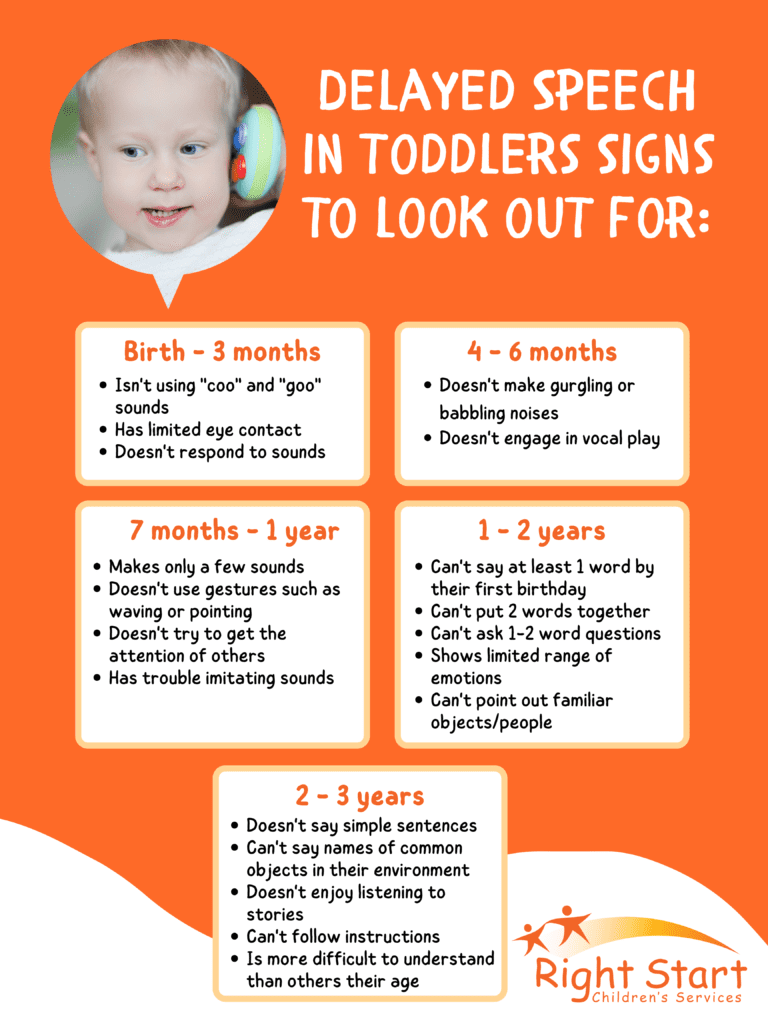Have you ever found yourself wondering why your child isn’t speaking as much as their peers? Or maybe you’re concerned about a friend’s little one who seems unusually quiet.
It’s natural to worry when speech doesn’t develop at the expected pace, and you’re not alone in seeking answers. Understanding what causes delays in speech can be crucial in helping your child or loved one reach their full potential. This article is here to shed light on the factors that might be affecting speech development, providing you with insights that can make a real difference.
Stay with us as we explore the common causes and what you can do to support better communication skills. Your curiosity and concern could be the first step toward meaningful change.

Credit: therapyandwellnessconnection.com
Common Developmental Milestones
Understanding speech development can help parents spot potential issues early. Children follow a general pattern as they learn to communicate. Recognizing these milestones can provide reassurance or indicate if further evaluation is needed.
Typical Speech Development Stages
Babies start with cooing and babbling as early as two months. By the age of one, they often say their first words. Toddlers, around two years old, begin forming simple sentences. By three, children usually understand basic instructions and can communicate needs.
As they grow, vocabulary expands rapidly. By four years, they should be able to tell simple stories. At five, clear speech and complex sentences become common. These stages provide a framework for assessing typical development.
Early Signs Of Speech Delay
Speech delay signs may appear as early as infancy. Limited babbling by nine months can be a concern. By 18 months, not speaking at least 20 words may indicate a delay. At two years, difficulty in forming two-word phrases is notable.
By age three, unclear speech or limited vocabulary might suggest a delay. If they struggle to follow simple instructions, it could be a sign. Recognizing these early signs can prompt timely intervention. Early action can support better outcomes for speech development.
Genetic Influences
Genetic influences play a role in speech delay. Certain genes can affect language development in children. Family history of speech issues might indicate a genetic component.
Genetic influences play a crucial role in the development of speech and language skills. You might wonder why some children speak fluently while others face challenges. Genetics can offer some answers. Understanding the genetic factors behind speech delays can help you seek early interventions and support for your child. Let’s explore how inherited traits and family history can impact speech development.
Inherited Speech Disorders
Certain speech disorders can be passed down through generations. If a parent or grandparent experienced speech issues, there’s a higher chance the child might too. This doesn’t mean it’s guaranteed, but the risk increases. For example, stuttering is known to have a genetic link. If someone in your family stutters, your child might also show signs. Knowing this can prepare you to notice early signs and seek help sooner. Genetic research continues to uncover more about how specific genes influence speech. This knowledge can lead to better-targeted therapies. If you suspect an inherited speech disorder, consider genetic counseling. It can provide valuable insights and options for managing the condition.
Family History Impact
Your family’s speech and language history can significantly impact your child’s development. If speech delays or disorders are common in your family, it’s important to be vigilant. Early intervention can make a big difference. Observe how relatives communicate. Are there patterns or common issues? This awareness can guide you in monitoring your child’s speech development closely. Has anyone in your family overcome a speech delay? Their experiences could offer valuable strategies and encouragement. Sharing these stories with your child can create a positive environment for speech improvement. By understanding genetic influences, you can become proactive in addressing speech delays. Do you know your family’s speech history? Consider discussing it with a healthcare professional to better support your child’s language journey.
Environmental Factors
Environmental factors play a crucial role in speech development. Children learn language from their surroundings. A stimulating environment aids in nurturing speech skills. Lack of such an environment can delay speech. The environment includes various elements like parental interaction and socioeconomic status.
Role Of Parental Interaction
Parental interaction is vital for speech development. Parents talking to their children encourage language skills. Quality interaction boosts vocabulary and understanding. Conversations should be frequent and engaging. Reading books together enhances language exposure. Active listening by parents is equally important. It helps children feel valued and heard.
Impact Of Socioeconomic Status
Socioeconomic status can affect speech development. Families with limited resources face challenges. They may lack access to educational materials. Stressful environments can hinder language growth. Children in these situations might need extra support. Access to speech therapy can be limited by income. Community programs can help bridge this gap.
Medical Conditions
Understanding the causes of speech delay can be challenging. Medical conditions are a significant factor. These conditions can interfere with a child’s ability to communicate. Identifying them early can help in managing speech delays effectively. Here, we explore some of the common medical conditions that contribute to speech delay.
Hearing Impairments
Hearing impairments can greatly affect speech development. Children need to hear sounds to learn how to speak. If a child has trouble hearing, their speech may be delayed. Regular hearing tests are crucial. They help detect any issues early on. Treatment can then be tailored to address these impairments.
Neurological Disorders
Neurological disorders can impact speech. Conditions like cerebral palsy affect brain function. They can lead to speech delays. The brain must process sounds and form words. When this process is disrupted, speech development suffers. Early intervention and therapy can aid in managing these challenges.
Psychological Aspects
Understanding the psychological aspects of speech delay can offer valuable insights. It’s not just about the physical ability to speak, but also the emotional and mental environment surrounding the individual. These psychological factors can significantly influence how and when speech develops.
Emotional And Behavioral Influences
Emotions play a crucial role in speech development. If a child feels insecure or shy, they might hold back from speaking. You might have noticed how some children speak freely at home but remain silent in school. This behavior can stem from feeling overwhelmed in unfamiliar settings. It’s essential to create a supportive environment that encourages expression and communication.
Behavioral patterns can also impact speech. A child who is overly pampered might not feel the need to speak to express their needs. Observing how children interact with their surroundings can offer clues. Are they using gestures more than words? Encouraging verbal communication through playful interactions can be beneficial.
Stress And Anxiety Effects
Stress and anxiety can be significant barriers to speech development. Imagine trying to speak in a foreign language when you’re feeling anxious. This is similar to what a child experiencing stress might feel when trying to communicate. High-stress environments can inhibit a child’s ability to express themselves verbally.
Parents and caregivers should be mindful of the stressors in a child’s life. Are there frequent changes that might be unsettling? Consistent routines and gentle encouragement can help alleviate anxiety. Consider how you can make communication a fun and stress-free experience for the child.
Have you ever thought about how your actions might influence a child’s speech development? Providing a calm and supportive atmosphere can make a world of difference. It’s not just about teaching words; it’s about nurturing a positive emotional environment.

Credit: www.sounderic.com
Nutritional Deficiencies
When it comes to understanding speech delays in children, nutritional deficiencies often play a significant role. Nutrition is not just about fueling the body; it’s about providing the right building blocks for growth and development. If a child isn’t receiving essential nutrients, it may impact their ability to develop speech skills effectively. Let’s explore how malnutrition and essential nutrients contribute to speech delays.
Impact Of Malnutrition
Malnutrition can affect a child’s growth and brain development, leading to speech delays. Without adequate nutrition, the brain doesn’t develop as it should. This can slow down the processes that are crucial for speech and language acquisition.
Think about it: have you ever felt foggy or slow after skipping a meal? Imagine that effect on a growing brain, day after day. It’s a sobering thought. Children who lack proper nutrition might struggle to grasp language, which can set them back significantly.
Moreover, malnutrition may lead to more severe health issues that further impede speech development. A child battling frequent illnesses due to poor nutrition might miss out on crucial learning opportunities.
Role Of Essential Nutrients
Essential nutrients are the building blocks of a healthy brain. Nutrients like iron, omega-3 fatty acids, and vitamins B6 and B12 are vital for cognitive functions. These nutrients support brain health and are directly linked to speech development.
Consider this: Omega-3 fatty acids, found in fish, are known to boost brain function. If your child isn’t getting enough, their brain might not be firing on all cylinders. Similarly, iron deficiency can lead to fatigue and decreased concentration, making it harder for a child to learn speech.
Ensuring your child receives a balanced diet rich in these nutrients can be a game changer. You don’t need to overhaul your entire pantry. Simple additions like leafy greens, nuts, and lean meats can make a significant difference.
Are you paying attention to your child’s diet? Could a few nutritional tweaks help them overcome speech delays? The solution might be simpler than you think.
Technological And Social Influences
Many factors contribute to delayed speech, including technology and social dynamics. Excessive screen time can limit face-to-face interactions, affecting speech development in children. Reduced social engagement might also hinder verbal skills, delaying communication milestones.
Understanding the impact of technological and social influences on speech delay offers a fresh perspective on how modern life affects communication skills. Children today are growing up in a digital age, surrounded by screens and digital devices. While technology brings numerous benefits, it also poses challenges to the development of essential skills like speech. Social interactions, too, have evolved, influenced by changing family dynamics and community structures. Let’s delve deeper into these factors.
Screen Time Effects
Excessive screen time can significantly impact a child’s speech development. When children spend long hours watching videos or playing games, they miss out on valuable opportunities for face-to-face interaction. My niece, for example, was glued to her tablet for hours each day and started speaking later than her peers. It’s crucial to find a balance between digital engagement and real-world communication. Interactive play and reading with adults can help mitigate the effects of screen time. Have you ever noticed how a simple game of ‘peek-a-boo’ or reading a bedtime story can spark joy and conversation?
Social Interaction Challenges
Changes in social interaction patterns can also lead to speech delays. In many households, busy schedules and digital distractions mean less family conversation time. My neighbor shared how their family dinner tradition, where everyone talks about their day, helped improve their child’s vocabulary. Children learn to communicate by mimicking and interacting with those around them. Attending playgroups or engaging in community activities can enhance their social skills. Are there opportunities in your community for children to connect and communicate with peers? By understanding these influences, you can take steps to foster a more enriching environment for speech development. Reducing screen time and encouraging social interactions can make a significant difference in a child’s ability to communicate effectively.
Cultural And Linguistic Diversity
Speech delays in children can be influenced by cultural and linguistic diversity. Children exposed to multiple languages might take longer to speak. This is due to their brains processing different sounds and structures. Each language adds complexity to speech development.
Cultural and linguistic diversity plays a significant role in speech development. Children growing up in diverse environments may experience unique challenges. These challenges can lead to speech delays. Understanding these factors helps parents and educators support speech development effectively.
Multilingual Environments
In multilingual homes, children hear multiple languages daily. This exposure can affect their speech development. Some children may take longer to learn words. This happens because their brain processes different languages simultaneously. Multilingual environments enrich cognitive growth. They might also slow down speech milestones. Parents often worry about speech delays in such settings. It’s important to remember that multilingualism is beneficial. It enhances brain function and cultural awareness. Children will eventually master multiple languages.
Cultural Expectations
Cultural beliefs influence speech development. Different cultures have varied expectations for children’s speech milestones. Some cultures prioritize early speech. Others focus more on social interaction. These differences can affect how children learn to speak. Parents might feel pressured by cultural norms. This pressure can lead to stress about speech delays. Educators should recognize these cultural differences. They should offer support without judgment. Understanding cultural expectations helps in creating supportive environments. These environments can nurture healthy speech development.

Credit: www.rightstartservices.com
Frequently Asked Questions
What Is The Most Common Reason For Speech Delay?
The most common reason for speech delay is often related to developmental issues, such as hearing impairments. These can affect a child’s ability to process sounds, leading to difficulties in speech development. Early intervention and assessment are crucial for addressing speech delay effectively.
Is It The Parents’ Fault For Speech Delay?
Parents are not always to blame for speech delay. Various factors like genetics, hearing issues, or developmental disorders can contribute. Early intervention and consultation with a speech therapist can help address concerns effectively. Parents play a crucial role in supporting their child’s speech development journey.
At What Age Is Speech Considered Delayed?
Speech is considered delayed if a child isn’t speaking by 18-24 months. By age 2, they should use simple phrases. Early intervention is crucial for language development. Parents should consult a pediatrician if concerned. Speech milestones vary, but awareness helps identify potential issues.
What Is A Red Flag For Speech Delay?
A red flag for speech delay is not using simple words by age two. Limited vocabulary and difficulty following instructions can also indicate a delay. Lack of gestures or social interaction might be concerning. Early identification and intervention are crucial for addressing speech delay effectively.
Conclusion
Understanding speech delays is crucial for helping children communicate. Early detection can make a difference. Parents should consult professionals if they notice delays. Simple exercises can support speech development. Patience is key in guiding children through their speech journey. Remember, each child develops at their own pace.
Encourage daily practice and interaction. Regular conversations boost confidence and skills. Stay informed about new methods and resources. Support from family plays a big role. A nurturing environment helps children express themselves freely. Keep exploring ways to aid your child’s speech progress.

